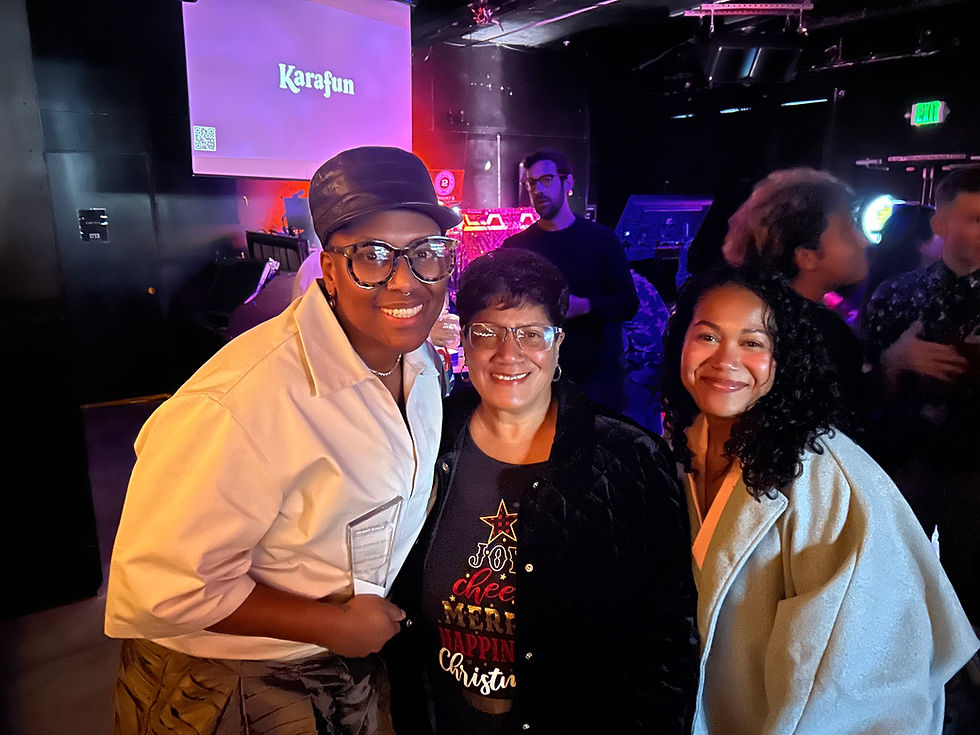A Deeper Look into the Ma'at Program – A Personal Perspective with April Cook-Suravallop
- admin409013
- Feb 15, 2024
- 3 min read
Updated: May 8, 2025

In the dynamic field of mental health care, the importance of culturally tailored programs cannot be overstated, especially when it comes to serving diverse communities. One such groundbreaking initiative is our Ma'at Program at HCN, dedicated to enhancing behavioral health outcomes for Black/African American children, youth, and families in San Francisco. This program, deeply rooted in Afro-Centric principles, not only offers therapeutic services but also makes a significant impact through community outreach and advocacy. Today, we are privileged to share insights from April Cook-Suravallop, a dedicated Ma'at child and family therapist at HCN. Her experience and perspectives shed light on the program's approach, its profound impact on the community, and the transformative journeys of those involved.
Interview with April Cook-Suravallop
Q: Can you give us an overview of the Ma'at Program and its primary objectives?
A: At the Ma'at Program, we're committed to addressing the legacies of racism and trauma, using Afro-Centric and culturally rich principles. Our comprehensive strategy encompasses individual and family therapy, community outreach, and advocacy. We focus on cultural competence, ensuring our services resonate deeply with the Black community.
Q: How does the Maat Program specifically cater to the needs of the Black community?
A: Our Afri-Centric approach, deeply understanding the unique experiences of the Black community, is key. With Black therapists and staff, we ensure cultural sensitivity and accessibility. We're not just addressing individual issues; we're actively involved in community advocacy to tackle broader systemic challenges.
Q: Could you share a particularly impactful experience you've had with a client in the Maat Program?
A: I recall working with a teen, focusing on unity and reciprocity. He applied these principles and successfully initiated a meaningful conversation with a classmate. This highlighted the practical impact of Ma'at's guidance on interpersonal skills and social interactions.
Q: How do you approach creating a safe and supportive environment for your clients?
A: Trust, open communication, and active listening are central to my approach. I discuss confidentiality and safety openly, establishing a foundation of trust and transparency. This fosters a positive therapeutic relationship, enhancing the effectiveness of our sessions.
Q: In what ways does your blackness influence your approach to therapy and mental health care?
A: My approach is guided by Kimberlé Crenshaw's insights on intersectionality. I focus on cultural competence and tailor therapy to the nuanced experiences within the Black community, affirming and validating racial and cultural identities.
Q: What inspired you to become a clinician within the Ma'at Program?
A: The program's African-Centric approach and commitment to addressing the needs of the Black community resonated with me. Joining Ma'at felt like finding a professional home where I could make a real difference.
Q: How has working in this program influenced your understanding of mental health in the Black community?
A: My understanding has deepened, emphasizing the importance of tailoring practices to the community's unique experiences. Addressing historical factors like intergenerational racism has been crucial in understanding systemic influences on mental health.
Q: What do you find most rewarding about your role in the Ma'at Program?
A: The most rewarding aspect is seeing individuals empowered and uplifted in the Black community, advocating for change and facilitating transformative journeys.
Q: Are there any specific challenges you face in your work, and how do you navigate them?
A: Addressing the impact of historical factors like systemic racism and intergenerational trauma is challenging. We tackle these by integrating them into our therapeutic approach and community advocacy.
Q: How do you see the Ma'at Program impacting the broader Black community?
A: Ma'at is reshaping the mental health landscape, breaking down barriers, and strengthening families. Our focus extends beyond therapy sessions, impacting the entire community by improving mental well-being and resilience.
Q: What future developments or goals are you most excited about for the Ma'at Program?
A: I'm excited about expanding our outreach and embedding our services deeper into the community to make mental health support more accessible and
Q: In one sentence, what does being a black therapist mean to you?
A: In the words of James Baldwin, “Not everything that is faced can be changed, but nothing can be changed until it is faced.”; as a Black therapist, this is the essence of my role– facilitating change by facing challenges head-on.
Our Ma'at program's commitment to cultural sensitivity and community engagement is more than a therapeutic approach; it's a movement toward holistic mental health care. April Cook's insights offer a glimpse into the transformative impact this program has on individuals and the broader Black community. As the Ma'at Program continues to evolve, its dedication to empowering the Black community through mental health care remains a beacon of hope and healing.


